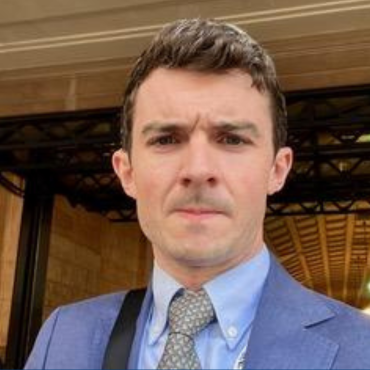Q&A with Dr Paul Armstrong
(opens in a new window)drpaulrichardarmstrong@gmail.com
What are the key points of your research synopsis?
 The incidence of hepatocellular carcinoma (HCC) is rising worldwide, with primary liver cancer now the third most common cause of cancer related death. This is against a backdrop of increased global prevalence of liver cirrhosis, which is the biggest risk factor for HCC as well as a significant determinant of outcome. My doctoral research, under primary supervisor Professor Stephen Stewart, combined clinical and basic science research to contribute advances in HCC care. In the clinical setting we investigated the value of non-invasive fibrosis assessment tools first in staging the degree of liver disease in complex cardiac patients, and subsequently in identifying certain patient populations at risk of HCC. In the laboratory we explored the biology of HCC. From a series of early HCC resection specimens we found that HCC develops within a dysregulated and immunosuppressive tumour immune microenvironment, characterised by populations expressing co-inhibitory receptors and displaying a pro-tumour regulatory phenotype. In a series of advanced HCC cases we found that neutrophil and lymphocyte populations exhibited divergent behaviours and could display pro or anti-tumour characteristics depending on whether they were located within tumour, in peritumoural liver tissue, or peripheral blood.
The incidence of hepatocellular carcinoma (HCC) is rising worldwide, with primary liver cancer now the third most common cause of cancer related death. This is against a backdrop of increased global prevalence of liver cirrhosis, which is the biggest risk factor for HCC as well as a significant determinant of outcome. My doctoral research, under primary supervisor Professor Stephen Stewart, combined clinical and basic science research to contribute advances in HCC care. In the clinical setting we investigated the value of non-invasive fibrosis assessment tools first in staging the degree of liver disease in complex cardiac patients, and subsequently in identifying certain patient populations at risk of HCC. In the laboratory we explored the biology of HCC. From a series of early HCC resection specimens we found that HCC develops within a dysregulated and immunosuppressive tumour immune microenvironment, characterised by populations expressing co-inhibitory receptors and displaying a pro-tumour regulatory phenotype. In a series of advanced HCC cases we found that neutrophil and lymphocyte populations exhibited divergent behaviours and could display pro or anti-tumour characteristics depending on whether they were located within tumour, in peritumoural liver tissue, or peripheral blood.
Could you share some highlights of your experience as a MD student?
A significant highlight for me was building up lab skills from scratch to successful and reproducible execution of complex laboratory experiments including immune cell isolation from fresh human liver cancer samples. More generally, my ability to design my own research projects or critically analyse those of others has improved beyond recognition over the course of my MD.
What advice would you give to someone considering undertaking a MD?
Do not underestimate the determination and perseverance required to stay the course with an MD project, especially one involving laboratory work. Practice the advice of Beckett; “Ever tried. Ever failed. No matter. Try again. Fail again. Fail better”.
What were some great aspects of pursuing your MD at UCD?
Having studied medicine in UCD and worked in both the main UCD teaching hospitals, there was an element of familiarity which was comforting. I found the UCD postgraduate facilities to be very useful in both the Mater and St. Vincent’s hospitals, which I used extensively. I was fortunate to receive excellent support from all my supervisors, and the online resources available to me at UCD in terms of software and library access helped me focus my energies on my research.